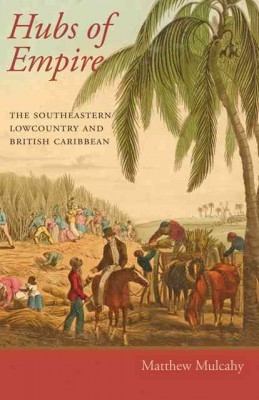| Hubs of Empire: The Southeastern Lowcountry and British Caribbean Contributor(s): Mulcahy, Matthew (Author) |
|
 |
ISBN: 1421414708 ISBN-13: 9781421414706 Publisher: Johns Hopkins University Press OUR PRICE: $25.65 Product Type: Paperback - Other Formats Published: November 2014 |
| Additional Information |
| BISAC Categories: - History | Caribbean & West Indies - General - History | United States - State & Local - Middle Atlantic (dc, De, Md, Nj, Ny, Pa) |
| Dewey: 972.9 |
| Series: Regional Perspectives on Early America |
| Physical Information: 0.64" H x 5.51" W x 8.45" (0.68 lbs) 256 pages |
| Themes: - Cultural Region - Latin America - Cultural Region - Caribbean & West Indies |
| Descriptions, Reviews, Etc. |
| Publisher Description: In Hubs of Empire, Matthew Mulcahy argues that it is useful to view Barbados, Jamaica, and the British Leeward Islands, along with the South Carolina and Georgia Lowcountry, as a single region. Separated by thousands of miles of ocean but united by shared history and economic interest, these territories formed the Greater Caribbean. Although the Greater Caribbean does not loom large in the historical imaginations of many Americans, it was the wealthy center of Britain's Atlantic economy. Large-scale plantation slavery first emerged in Barbados, then spread throughout the sugar islands and the southeastern mainland colonies, allowing planters to acquire fortunes and influence unmatched elsewhere--including the tobacco colonies of Maryland and Virginia. Hubs of Empire begins in the sixteenth century by providing readers with a broad overview of Native American life in the region and early pirate and privateer incursions. Mulcahy examines the development of settler colonies during the seventeenth and early eighteenth centuries, explores diverse groups of European colonists, and surveys political, economic, and military issues in the decades before the Seven Years War. The plantation system achieved its fullest and harshest manifestation in the Greater Caribbean. The number of slaves and the scale of the slave trade meant that enslaved Africans outnumbered Europeans in all of the affiliated colonies, often by enormous ratios. This enabled Africans to maintain more of their traditions, practices, and languages than in other parts of British America, resulting in distinct, creole cultures. This volume is an ideal introduction to the complex and fascinating history of colonies too often neglected in standard textbook accounts. |
Contributor Bio(s): Mulcahy, Matthew: - Matthew Mulcahy is a professor of history at Loyola University Maryland. He is the author of Hurricanes and Society in the British Greater Caribbean, 1624-1783, also published by Johns Hopkins. |